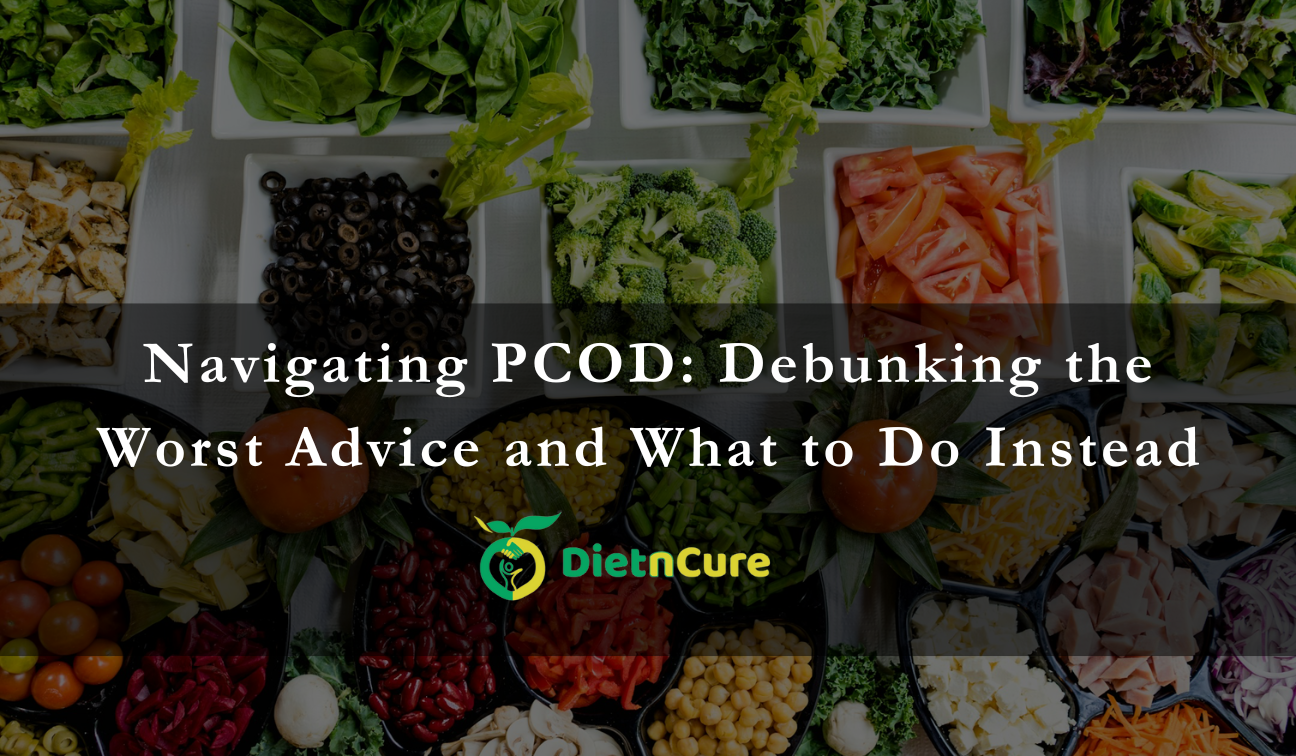Navigating PCOD: Debunking the Worst Advice and What to Do Instead
Introduction
Welcome to the journey of understanding Polycystic Ovary Syndrome (PCOS), a hormonal puzzle that affects many women. Diet n Cure is here to guide you through the maze of misconceptions surrounding PCOD and equip you with evidence-based strategies for effective management. Let’s embark on this enlightening exploration together, as we delve into the depths of PCOD, debunk common myths, and pave the way for empowered wellness.

Understanding PCOD
PCOS (Polycystic Ovary Syndrome) is a metabolic disorder in which the woman affected by hormonal imbalance in their reproductive years (between ages 12 and 51). Due to increase level of male hormones females might skip menstrual periods, have irregular ovulation making it hard to get pregnant, get abnormal hair growth on the body and face simultaneously it can lead to heart disease and diabetes in long term. PCOS is a serious medical condition, and it requires proper medical attention or surgical treatment.

Symptoms of PCOD

Common Myths about PCOD
Truth: PCOD is actually one of the most common hormonal disorders affecting women of reproductive age. It’s estimated that up to 10% of women worldwide may have PCOD. Despite its prevalence, PCOD often goes undiagnosed or misdiagnosed due to its varied symptoms and complex nature.
Truth: While obesity is a common characteristic of PCOD, women of all body types can be affected by the condition. Lean women can also have PCOD and may experience similar symptoms and complications. However, obesity and insulin resistance are frequently associated with PCOD and can exacerbate its symptoms.
Truth: PCOD is a complex metabolic disorder that affects multiple body systems beyond reproductive health. While it is characterized by symptoms such as irregular menstrual cycles, ovarian cysts, and infertility, PCOD is also associated with insulin resistance, obesity, cardiovascular disease, and psychological disturbances such as depression and anxiety. Women with PCOD have an increased risk of developing type 2 diabetes, high blood pressure, and heart disease compared to women without the condition.
Truth: While medications such as birth control pills, insulin-sensitizing agents (e.g., metformin), and anti-androgen medications can help manage symptoms of PCOD, they do not address the underlying hormonal imbalance. PCOD is a chronic condition that requires long-term management and lifestyle modifications to optimize health outcomes. A comprehensive approach that includes dietary changes, regular physical activity, stress management, and medication management is essential for effectively managing PCOD and improving quality of life.
Truth: PCOD can have significant implications for a woman’s health and quality of life. In addition to reproductive issues such as infertility and pregnancy complications, PCOD is associated with an increased risk of metabolic disorders such as type 2 diabetes, high cholesterol, and fatty liver disease. Women with PCOD are also at higher risk for developing cardiovascular disease, including heart attacks and strokes. Furthermore, PCOD can have a profound impact on psychological well-being, leading to symptoms such as depression, anxiety, and low self-esteem. It’s important to recognize PCOD as a serious medical condition that requires proactive management and support from healthcare professionals.

Optimal Strategies for PCOD Management
1. Balanced Nutrition: Focus on a balanced diet rich in whole foods such as fruits, vegetables, lean proteins, and whole grains. These nutrient-dense foods provide essential vitamins, minerals, and antioxidants to support hormone balance and metabolic health. Incorporate high-fiber foods like vegetables, beans, and whole grains to regulate blood sugar levels and promote satiety. Limit processed foods, sugary snacks, and refined carbohydrates, as they can exacerbate insulin resistance and hormonal imbalances.2. Regular Physical Activity: Engage in regular exercise to improve insulin sensitivity, promote weight loss, and alleviate PCOD symptoms. Aim for at least 150 minutes of moderate-intensity aerobic activity or 75 minutes of vigorous-intensity aerobic activity per week, as recommended by the American College of Obstetricians and Gynecologists (ACOG). Incorporate a variety of activities such as walking, jogging, cycling, swimming, or dancing to keep workouts enjoyable and sustainable. Strength training exercises using resistance bands, dumbbells, or body weight can help build muscle mass, increase metabolism, and improve body composition.3. Stress Management: Chronic stress can exacerbate PCOD symptoms by increasing cortisol levels and disrupting hormonal balance. Practice stress-reduction techniques such as mindfulness meditation, deep breathing exercises, progressive muscle relaxation, or yoga to promote relaxation and reduce stress levels. Prioritize self-care activities that bring joy and relaxation, such as spending time in nature, reading a book, listening to music, or spending quality time with loved ones. Establishing healthy boundaries, practicing time management, and seeking support from friends, family, or a mental health professional can also help manage stress more effectively.4. Medication Management: Work closely with your healthcare provider to determine the appropriate medications for managing PCOD symptoms. Oral contraceptives (birth control pills) are commonly prescribed to regulate menstrual cycles, reduce androgen levels, and alleviate symptoms such as acne and hirsutism. Metformin, an insulin-sensitizing medication, may be prescribed to improve insulin resistance and regulate menstrual cycles in women with PCOD who have insulin resistance or prediabetes. Anti-androgen medications such as spironolactone may be used to reduce excess hair growth and acne by blocking the effects of androgens on the skin.5. Support and Education: Seek support from healthcare professionals, support groups, and online resources to learn more about PCOD and connect with others who are navigating similar challenges. Education and empowerment are essential for effectively managing PCOD and optimizing your health and well-being. Stay informed about the latest research and treatment options for PCOD, and advocate for yourself by actively participating in your healthcare decisions. Remember that you are not alone in your PCOD journey, and support is available to help you navigate the challenges and embrace a life of vitality and resilience.

Conclusion:
In conclusion, PCOD is a multifaceted condition that requires a comprehensive approach to management. By understanding the symptoms, debunking common myths, and implementing evidence-based strategies for PCOD management, you can take control of your health and well-being. Remember, you are not alone in your PCOD journey, and support is available to help you navigate the challenges and embrace a life of vitality and resilience.



